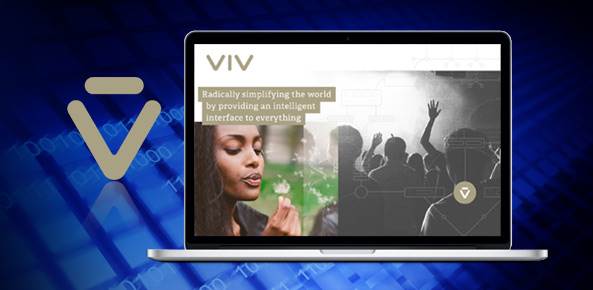One of the creators of the artificial intelligence (AI) behind Siri, the digital assistant acquired by Apple in 2010, today demonstrated a next-generation AI called Viv that he said could eventually let people “converse” with any smart device in the Internet of things.
Siri creator Dag Kittlaus currently runs a San Jose startup called Viv Labs, founded with fellow Siri creator Adam Cheyer. (Another Siri creator, Tom Gruber, now works for Apple.) At the Disrupt NY 2016 tech conference in New York today, Kittlaus gave a live demonstration of his company’s latest creation, Viv (“viv” comes from Latin word, “vivus,” which means “alive”).
Kittlaus said Viv represents the next “new paradigm” for how people interact with computers. The technology’s unique character comes from its use of dynamic program generation, an intelligent method for creating software on the fly depending upon the intent of a user’s request.
‘Software That’s Writing Itself’
“We’re going to use this technology to breathe life into the inanimate objects and devices of our life through conversation,” Kittlaus said during his demonstration. Kittlaus gave several spoken queries to Viv during the presentation and received quick and accurate answers even to complex questions like, “Will it be warmer than 70 degrees near the Golden Gate Bridge after 5 p.m. the day after tomorrow?”
Unlike other intelligent assistants Viv uses a “computer science breakthrough” that — after using speech recognition and determining a user’s intent based on the words spoken — automatically creates a software program to produce an accurate and relevant response to a question or request, Kittlaus said.
“This is software that’s writing itself,” Kittlaus said. The process, which takes just 10 milliseconds or so, enables Viv to scale in ways that other digital assistants currently cannot, he added.
Viv’s Goal? ‘Ubiquity’
Viv Labs plans to begin launching its AI toward the end of the year, first through a select group of partner, Kittlaus told TechCrunch editor-in-chief Matthew Panzarino during an on-stage Q&A after the demonstration. Eventually, Viv will be opened up to developers at large to allow them to create a wide range of uses for the technology. Viv can already interact with users and enable transactions such as ordering flowers through ProFlowers or reserving a ride through Uber.
For consumers, Kittlaus said he envisions Viv becoming “the intelligent interface to everything.” For developers, Viv will be the next great marketplace and channel for offering content, commerce and services, he said.
By enabling people to interact with smart devices through conversation, Viv offers an easier and more natural way to interact with computers than, say, apps do, Kittlaus said. “I think kids will be asking in future, ‘How did you get along without your assistant?'” he said.
Unlike with Siri, Viv Labs has no plans to sell its technology to a larger tech firm. Instead, Kittlaus said his company is in talks with most every major firm in the world to put it on almost every device. “Our goal for this is ubiquity,” he said.
Image Credit: Viv Screenshots ©2016 Viv Labs.






